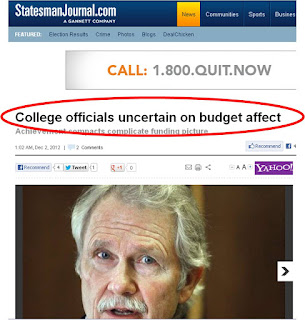Thursday morning made
the previous day seem like a picnic at the park! It was, as a
neighbor put it, dreary, though that might have been an understatement.
I decided to wait a tad. But, there was no change in the weather conditions. After a while, I started driving, and took the back roads again. After all, it is highly probable that, come January, I will take the freeway and avoid old man winter on the back roads until spring is in the air.
It was dark even at 830 in the morning. And pouring. Yet, it was a pleasure to drive. Rain and clouds and fog have become familiar to me over the years, and for the most part, they have been harmless to me.
About half way to the college, the skies started to clear up, and the rain stopped. Traces of blue sky amidst the dark clouds were remarkably beautiful, and I started humming "
I can see clearly now, the rain is gone...."
It was a short-lived excitement, however.
Emergency vehicle lights at a distance. I started slowing down, and soon, it was a complete stop. Quite a few vehicles behind me, and in front as well. I turned the engine off, confident that it would be a while.
There was something odd about the deeply sagging cables from the utility poles on the side, which meant that a pole was down not too far away. There were only two possibilities: either the winds toppled a pole in the water-sogged ground, or a vehicle had rammed into a post.
I hoped it was not the latter, especially because in these back roads, there is not any steady slope from the road to the ground. Instead, it is a sharp two-plus feet drop from the road to the ditch. It would be a lucky driver to escape that kind of an accident without any injury whatsoever.
I stepped out of the vehicle. The air felt crisp and clean. With so many vehicles stopped right on the road, I
was reminded of the summer when I was among the many who patiently waited for the highway patrol to lead us through the forest fires. All of a sudden, it felt like I was on a vacation and not on my way to work and, strangely enough, I felt happy that we had been forced to stop and reflect on life.
A few vehicles ahead of me started making sharp u-turns and headed back, and I climbed back on to my seat. I wondered what these drivers were hurrying for, and what they were going to gain by turning around and taking some other route. If only they had read
Rumi:
What is this competition we feel then,
before we go, one at a time, through the same gate?
It surely was their loss, because it seemed like the emergency lights were disappearing. Sure enough, traffic started flowing from the other side. And soon we started moving too.
Over on the side, a utility pole was flat on the ground and a tow-truck was hauling away a pickup.
Life resumed for me. I wonder how much life changed that morning for the occupants of that pickup truck. We never know how good we have it all until disaster strikes. I should know by now!










